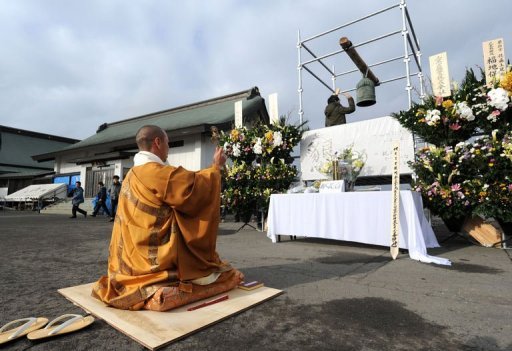Japan marks anniversary of tsunami tragedy

A Buddhist monk prays for the victims of the March 11, 2011 tsunami as part of the first year anniversary of the disaster at Fuseiji temple in Ishinomaki, Miyagi prefecture on March 11, 2012
Tearful families were gathering in the still shell-shocked towns and villages across the northeast coast to remember those lost when the towering tsunami smashed ashore.
At 2.46 pm (0546 GMT) trains will stop, shoppers will stand still and people throughout the archipelago will fall silent to mark the moment nature's fury was visited on Japan, when the 9.0-magnitude quake set off a catastrophic chain of events.
At a national ceremony of remembrance in Tokyo, the prime minister and the emperor will lead silent prayers for those who lost their lives in the country's worst post-war disaster.
Small rural towns along the coast that were turned to matchwood when the tsunami rolled in, wrecking whole neighbourhoods and wiping out communities, will hold their own emotional ceremonies.
In Ishinomaki, bereaved families were due to visit graves to leave flowers in memory of those who died.
Keishitsu Ito said the anniversary was an intensely sad day for him.
"My wife was washed away by the tsunami. I will put these flowers on her grave," the 80-year-old told AFP.
"I am sad. I have no one to talk to anymore... or to argue with."
Bright sunshine on Sunday replaced the rain that has soaked the city for days.
Fukushima A morning "reconstruction walk" through Ishinomaki's main streets saw participants marching silently in memory of those who died in a city that accounted for around a fifth of the national death toll.
In Okuma, home to the crippled Fukushima nuclear plant, displaced residents arrived by bus to pay their respects to lost loved ones.
meltdown Television footage showed sobbing relatives in full protective suits, gloves and shoe covers holding a ceremony for those who perished in the town.
An elderly woman, whose grandchild is still listed as missing, wept as she laid flowers at a makeshift alter.
nuclear "I want my grandchild to be found," she told reporters.
In the nearby city of Koriyama, monks banged drums and offered prayers ahead of a protest rally at which organisers were expecting 20,000 people.
Among those demonstrating will be some of the nuclear refugees forced to flee their homes in the shadow of Fukushima Daiichi as it began venting toxic radiation over homes and farmland.
The government and plant operator Tokyo Electric Power (TEPCO) announced in December "a state of cold shutdown" for three runaway reactors that went into meltdown when their cooling systems were swamped by the tsunami.
But with radiation having leaked from the crippled plant for months, many parts of a 20-kilometre (12-mile) exclusion zone around it are likely to remain uninhabitable for years -- perhaps decades -- to come, scientists warn.
At TEPCO's Tokyo headquarters near the Imperial Palace, around 50 protesters unfurled banners Sunday morning demanding the shuttering of all nuclear plants in Japan.
Radiation fears across Fukushima and beyond were expected to swell the number of those taking part in the protests.
Setsuko Kuroda, an organiser the Koriyama protest said: "We demand all children are evacuated from Fukushima now."
"Some experts say one third of children in Fukushima were affected by radiation," she said. "Leaving the situation like this is like they are committing a murder every day."
Japanese television stations broadcast a series of special programmes to mark the first anniversary of the March disasters.
TV Asahi began 12 hours of special programming from noon, which will include live coverage of the national ceremony, along with news shows and features on the disaster.
The anniversary comes after it was revealed cabinet ministers had been warned of the possibility of meltdowns at Fukushima in the hours after the waves struck, but did not acknowledge this in public for two months.
What the stars mean:
★ Poor ★ ★ Promising ★★★ Good ★★★★ Very good ★★★★★ Exceptional
 Tag:
Tag:
Related Contents
Latest News
More News
- Russian President congratulates Vietnamese Party leader during phone talks (January 25, 2026 | 09:58)
- Worldwide congratulations underscore confidence in Vietnam’s 14th Party Congress (January 23, 2026 | 09:02)
- Political parties, organisations, int’l friends send congratulations to 14th National Party Congress (January 22, 2026 | 09:33)
- 14th National Party Congress: Japanese media highlight Vietnam’s growth targets (January 21, 2026 | 09:46)
- 14th National Party Congress: Driving force for Vietnam to continue renewal, innovation, breakthroughs (January 21, 2026 | 09:42)
- Vietnam remains spiritual support for progressive forces: Colombian party leader (January 21, 2026 | 08:00)
- Int'l media provides large coverage of 14th National Party Congress's first working day (January 20, 2026 | 09:09)
- Vietnamese firms win top honours at ASEAN Digital Awards (January 16, 2026 | 16:45)
- ASEAN Digital Ministers' Meeting opens in Hanoi (January 15, 2026 | 15:33)
- ASEAN economies move up the global chip value chain (December 09, 2025 | 13:32)




















 Mobile Version
Mobile Version